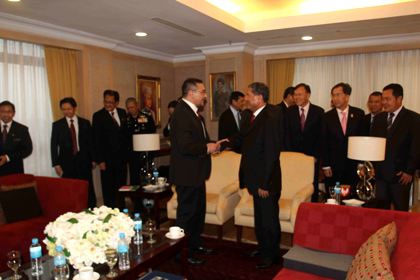Chalerm upbeats of his visit to Kuala Lumpur
Although Deputy Prime Minister Chalerm Yubamrung is yet to pay his first visit the restive deep South in his capacity as the new boss in charge of security affairs there, he has already visited Malaysia to seek Kuala Lumpur’s help to solve the unrest problem as well as the problem about southern Malay Muslims working in "tom yam kung" restaurants in Malaysia.

Mr Chalerm led a high-level delegation to Malaysia, comprising National Security Council chief Lt-Gen Paradorn Patthanathabut, Southern Border Provinces Administration Centre chief Pol Colonel Thawee Sodsong, Army Chief-of-Staff General Udomdej Seetabut, Employment Services Department chief Prawit Kiangpol and governors of five southern provinces which include Yala, Pattani, Narathiwat, Satun and Songkhla.
During the visit from January 8-10, the Thai delegation met with Malaysian Prime Minister Najib Razak and his interior minister.
Upon the delegation’s return to Bangkok, Mr Chalerm disclosed that the two countries signed an agreement of joint cooperation on five areas: cooperation to combat against transnational crimes; extradition of criminal suspects; exchange of prisoners; cooperation to combat human and illicit drugs trafficking; and cooperation to facilitate cross-border traveling for citizens of the two countries.
The deputy prime minister said that Mr Razak reiterated Kuala Lumpur’s opposition to separatism of Thailand’s southernmost region but stopped short of offering to help mediate the armed conflict between the Thai government and militant groups in the deep South.
However, Lt-Gen Paradorn said Kuala Lumpur was ready to act as the intermediary for peace talk with the militant gangs if so requested by the Thai government. He added that Malaysia played a key role in working out a ceasefire in Mindanao between the Philippine government and Moro rebels.
Regarding the "tom yam kung" issue, Mr Chalerm said most of the Malay Muslims working in tom yam kung restaurants in Malaysia do not have work permits and have to work illegally.
There are about 6,500 tom yam kung restaurants scattering in 13 states of Malaysia. The premises employ some 150,000 Thai workers but only 6,900 of them were properly registered and have work permits.
A work permit costs a big amount of money and Malaysia normally issues work permit only to chefs and assistant chefs. Permits are not granted to other employees such as waiters or waitresses.
Mr Chalerm said he had asked Kuala Lumpur to allow the waiters to be registered - although not issued with work permits – so they can work without the risk of being arrested and will be able to send their earnings back homes to their families.
As for the unrest problem, the deputy prime minister maintained that only peace process – not military means - would bring about a durable solution to the problem.
